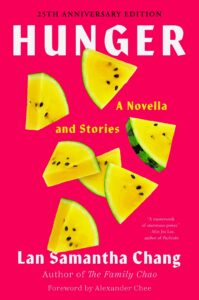In an interview she gave to The Morning News in 2005 Lan Samantha Chang described herself as someone who had at first wanted to write novels, many novels, but could not write stories more than 25 pages long. And the stories do have a remarkable, almost paradoxical density to them, a weight that also seems carried so easily on her sentences.
She told the interviewer, David Birnbaum, that she was trying to break it to her family that she would be an artist, aiming for a rebellion and acknowledging that it looked at first like she’d acquiesced to their plans for her by attending Yale, Harvard, Iowa, and Stanford. By the time she got to Iowa she was writing. Her parents thought of her as sowing wild oats, as if she were a bachelor putting off getting married. One of her sisters told people she was going to journalism school. “I am working up to the big rebellion,” she said. And it may be that writing the rebellious daughter characters in her debut collection was like a rehearsal for doing the same herself. But it may be she had her eye on something else.
Chang was 31 years old in 1998 when she debuted with Hunger. The reviews were raves, the praise, incandescent. The New York Times profiled her two years after publication as if to observe just how extraordinary the collection and the reviews had been. The critics said often that Chang was writing about lost homelands but you will see that these are stories mostly about the new homeland, not lost at all. These are mostly stories about America, about people who gave up everything to move here only to learn they would need to give up even more. People who fled China for Taiwan and who then had to flee Taiwan as well.
These are stories mostly about the new homeland, not lost at all.
“Pipa’s Story,” the story set firmly in China, is the last story in the collection and the first story she published. It appeared in the Atlantic in 1993 and was selected for Best American Short Stories 1994, edited by Tobias Wolff. The attention she received after that story alone nearly got her a book deal but she wanted to choose her moment. “I was afraid of being that young writer whose acclaim surprised me into silence. I wanted to wait until I knew what and who I wanted to be as a writer,” she said. After she appeared in the Best American Short Stories 1996 edition edited by John Edgar Wideman, with “The Eve of the Spirit Festival,” published in Prairie Schooner in 1995, she seemed to know something more of the what and who she wanted to be, and this is the result.
Hunger takes its name from a novella she has said she wrote in six months, a short time by her measure. “Hunger” is a tour de force, told from the point of view of a mother describing the war that develops between her demanding, disappointed husband Tian and his demanding, disappointed daughter Ruth. Their inability to see how alike they are, to apologize to each other, each brings the other to their knees, a final doubled humiliation that overshadows the mother and the other sister. But this is no ordinary story of tragedy, and in the determination of the mother, speaking from beyond the grave, to tell the story of her husband, her daughters and herself, we find a very different kind of beauty, love, and intelligence. I won’t ever forget Tian, who carried his violin wrapped in oil cloth over his head as he swam to the boat that helped him escape China and then had to spend his life as an adjunct at a music school that would not give him tenure but tried to take credit for the education he gave his daughter.
While her stories here do have some themes that repeat, they each feel distinct. It is not repeating oneself when writing about Chinese immigrants in the mid to late 20th century to have highly educated professional fathers working in restaurants, fathers who are passed over for promotions, fathers with defiant daughters. There are also the mothers who feel trapped by their husbands’ decisions or their husband’s failures, the mothers who feel betrayed by their daughters’ independence and even their childhood rebellions. But they do not blend together. Reading this collection now it feels like the kind of story collection you could educate yourself with, on how to treat your parents, your spouse, your children, in order to avoid the conflicts here. It is a wise book, for the way it is full of the sorts of mistakes people make and cannot take back. But what’s more, the haunting decision in one story, to skip drinks with co-workers, contrasts with the haunting decision to host drinks for co-workers too many times in another. You as the reader come to understand the way it doesn’t matter. There is no special key here at least to get your coworkers to understand that you’re human, that you fear you could die in front of them and it wouldn’t matter. I see the stories as being about people lost inside of a system indifferent to their survival, and indifferent to the beliefs they have about what it takes to succeed.
There are no weak stories to my mind in this very slim collection. And if Chang seems to know a great deal about the violin in these stories, or the life of the precocious performer, she was a precocious violinist as a child. If she seems to know the Midwest, she was born in Appleton, Wisconsin in 1965. Her parents are Chinese immigrants who came to the United States in 1949–a chemical engineer and a piano teacher. There is something especially moving about the way they helped her with the research she did at Princeton for her first novel, Inheritance, helping her with the Chinese translations of the materials.
While her stories here do have some themes that repeat, they each feel distinct.
She has published only novels since this first collection, three of them, no other stories thus far. The titular novella, “Hunger,” in that context, would seem to be where she broke free from who she had been, the writing of it letting her reach for who she would eventually become.
*
Full disclosure: I was a classmate of Chang’s at the Iowa Writers’ Workshop, a year behind her. She had the blithe confidence of a house captain when she hosted us, and she still does in her new role as director, a job she took back in 2005, where I also taught alongside her at Iowa in 2011 when I was invited there. In preparing to write this, I found myself reading the profiles, the interviews, seeing how the young writer declared she would do X, and the next iteration of her declared it done, whether it was writing a novel when she was ready to do so or raising enough from donors to give the writers at the Workshop more support. She has attained enough to receive the sort of introduction I hate: “I don’t need to list all of her many fellowships and awards,” this sort of person says, and yet you do, you should: she had to earn them to be where she is, writing as she is, in America.
This book returns now to a publishing landscape that is very different from the one in which it first was published. Imagine back to when the many successful writers of color Chang has shepherded just through the Iowa Writers Workshop in her time as the director have not even imagined themselves as writers yet. Some are yet to be born. There were so few Asian American women writers that Chang was compared to two writers she does not at all resemble in style–Amy Tan and Maxine Hong Kingston–and who are in turn very different from each other. Whatever big rebellion she had on her mind back in 2005, she is one of the few American writers who can be said to have actively worked to change the literary landscape in which she is understood, helping to create a more diverse literature in which she might actually be seen for the writer she is.
Please welcome again Lan Samantha Chang and Hunger.
__________________________________

Excerpted from Hunger (25th Anniversary Edition) by Lan Samantha Chang, forward by Alexander Chee. Copyright © 2023. Available from W.W. Norton & Company.
